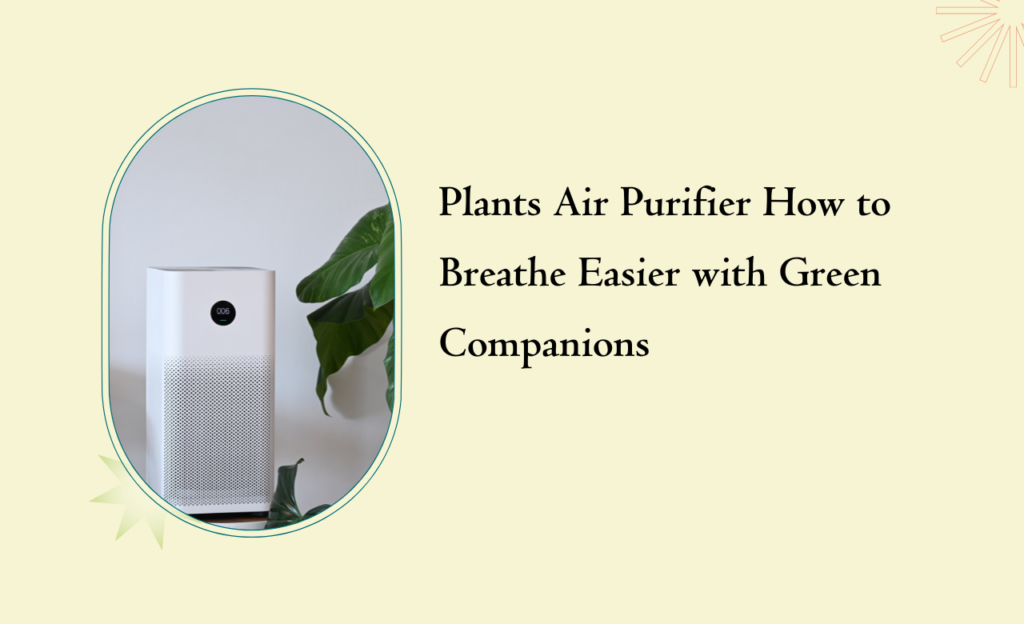Indoor air quality is a growing concern in our modern lives, with pollutants and allergens posing health risks in our homes and workplaces. While mechanical air purifiers are a popular solution, nature offers an effective and aesthetically pleasing alternative: plants. Certain houseplants can significantly improve indoor air quality by filtering out toxins and releasing oxygen. In this blog, we will explore how plants air purifier, the science behind their air-cleaning abilities, and the best plants to enhance your indoor environment.
The Science Behind plants air purifier
Photosynthesis and Oxygen Production
Plants are natural air purifiers through the process of photosynthesis, where they absorb carbon dioxide (CO2) and release oxygen (O2). This process not only replenishes oxygen levels in the air but also reduces CO2, contributing to a fresher and healthier indoor environment.
Phytoremediation: Absorbing Toxins
Phytoremediation is the process by which plants absorb, sequester, and metabolize pollutants from the environment. Houseplants can absorb harmful chemicals such as benzene, formaldehyde, trichloroethylene, xylene, and ammonia, which are commonly found in indoor air due to off-gassing from furniture, carpets, cleaning products, and paints.
Microbial Interaction in the Soil
The root systems of plants, in conjunction with the soil, host a diverse community of microorganisms. These microbes can break down and neutralize pollutants absorbed by the plants. This symbiotic relationship enhances the plant’s ability to clean the air and contributes to overall indoor air quality.
Best Air-Purifying Plants
1. Spider Plant (Chlorophytum comosum)
The spider plant is one of the most effective air purifiers, known for its ability to remove formaldehyde, xylene, and toluene from the air. It is also easy to care for, making it a popular choice for beginners. The spider plant thrives in indirect sunlight and requires minimal watering, making it a resilient and low-maintenance option for improving indoor air quality.
2. Peace Lily (Spathiphyllum)
The peace lily is not only an elegant addition to any space but also a powerful air purifier. It can remove toxins such as benzene, formaldehyde, trichloroethylene, and ammonia. Peace lilies thrive in low light conditions and require moderate watering. However, they are toxic to pets, so placement should be considered if you have animals in your home.
3. Snake Plant (Sansevieria trifasciata)
The snake plant, also known as mother-in-law’s tongue, is a hardy plant that can thrive in low light and irregular watering conditions. It is excellent at filtering out formaldehyde, xylene, and toluene. Snake plants are also unique because they perform photosynthesis at night, making them ideal for bedrooms as they continue to release oxygen while you sleep.
4. Aloe Vera (Aloe barbadensis miller)
Aloe vera is renowned for its medicinal properties, but it also serves as an effective air purifier. It can remove formaldehyde and benzene from the air. Aloe vera plants require plenty of sunlight and minimal watering, making them suitable for sunny spots in your home.
5. Boston Fern (Nephrolepis exaltata)
Boston ferns are excellent at removing formaldehyde and xylene from the air. They prefer humid environments and indirect sunlight, making them ideal for bathrooms or kitchens. Regular misting and watering are necessary to keep Boston ferns healthy and effective as air purifiers.
6. Bamboo Palm (Chamaedorea seifrizii)
The bamboo palm is a robust air purifier that can filter out benzene, formaldehyde, and trichloroethylene. It thrives in indirect light and prefers moist soil. Its lush, tropical appearance adds a touch of greenery to any indoor space while improving air quality.
Benefits of Using plants air purifier
Improved Air Quality
By absorbing pollutants and releasing oxygen, air-purifying plants enhance indoor air quality. This can lead to reduced symptoms of allergies, asthma, and other respiratory issues.
Enhanced Mood and Productivity
Numerous studies have shown that the presence of plants can improve mood, reduce stress, and enhance productivity. The calming effect of greenery can create a more pleasant and conducive environment for work and relaxation.
Natural Humidifiers
Plants release moisture into the air through a process called transpiration. This can help maintain optimal humidity levels indoors, preventing issues like dry skin, respiratory discomfort, and static electricity.
Aesthetic Appeal
Air-purifying plants add natural beauty to any indoor space. Their presence can enhance the decor and create a more inviting and vibrant atmosphere.
Tips for Maximizing the Benefits of Air-Purifying Plants
Placement
Strategic placement of air-purifying plants is crucial for maximizing their effectiveness. Place them in areas with good airflow, such as near windows or vents, to ensure that the clean air circulates throughout the room.
Variety
Incorporate a variety of plants to target different pollutants. Different plants are effective at removing specific toxins, so a diverse selection can provide comprehensive air purification.
Care and Maintenance
Proper care and maintenance are essential to keep your plants healthy and effective. Ensure they receive the appropriate amount of light, water, and nutrients. Regularly dust the leaves to allow for optimal absorption of pollutants.
Consider Pet Safety
Some air-purifying plants can be toxic to pets. If you have cats or dogs, research pet-safe options and place any potentially harmful plants out of reach.
Conclusion
Plants are nature’s air purifiers, offering a sustainable and aesthetically pleasing way to improve air purifiers with washable filters. From the hardy snake plant to the elegant peace lily, there are numerous options to choose from, each with unique air-cleaning abilities. By incorporating these green companions into your home or office, you can create a healthier, more pleasant environment while enjoying the many benefits that plants provide. Embrace the power of nature and let plants help you breathe easier.

